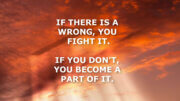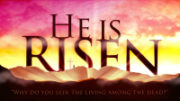 Dan Wolf, Author and
Dan Wolf, Author and
VCA AdvisorGiven all of the discussion today about our ‘rights’ to things such as healthcare, education, a job, etc.; I think it is appropriate we look at exactly what our role is in creation. What we own, what we owe, and what we are responsible for. We seem to have forgotten much, even within many of our churches.
Jonathan Edwards stated that the creator of something is also its governor. As one had the power to create, they also had the power to change and/or to end. There is only one assumption being made for this article, and that is that God has created everything that has ever been created (see below). I believe this, and it is not a stretch. It’s an act of faith, but it is the only rational assumption one can make. There is simply no other philosophic thought or framework that can truly explain existence, morality, or knowledge – take your pick. You have also been given the gift of free will—freedom—by Him as well.
So what did our Creator create? From Genesis, chapter 1;
- Day 1, Light. There was evening and morning. There was time.
- Day 2, The Heavens. The waters above were separated from the waters below.
- Day 3, The Earth. The waters below formed the earth and seas. All vegetation growing from seed, and the things from the earth itself we use were created.
- Day 4, Lights in the Heavens. The stars, the greater light of the sun and lesser light of the moon. These were made to not only separate light from darkness, but as signs for the seasons to mark the passage of time.
- Day 5, Things of the air and sea. All the creatures that move through the air and sea.
- Day 6, Beasts of the earth and man. Unlike anything else in all of creation, man was made in his Creator’s image. Man was also given dominion (stewardship) over all of the things of the air, land, and sea.
Finally, after all had been created it was declared by Him to be very good.
As man created none of the things noted above, he therefore does not own any of them. Each of our lives is a gift from God. While we have stewardship, even the land does not belong to us. This is reiterated in Leviticus 25:23. “The land, moreover, shall not be sold permanently, for the land is Mine; for you are but aliens and sojourners with Me.” We are finite, while He is infinite. If the land is not ours, then how can anything which comes from it be ours?
But even though none of these things are ours, they were certainly made for our use, to assist us on our journey with Him as just stated above. That journey is the reason for our existence. We are therefore, not to set our eyes on those things of this world but on their maker. The journey’s purpose is to come to know Him, and be like Him to the extent we are able. We were specially made for this purpose as nothing else in creation has been. We were given His image, an inward image. It is by this image, the mind that is within man, that we are able to have a relationship with Him. Although this image is remote, there is nothing else like it in all creation.
Completing that purpose requires learning, in both reason and faith as our Creator cannot be proved by man. He is beyond our human reasoning ability. However, by that same token neither can he be disproved by man’s reason. This is where faith steps in as first causes cannot be demonstrated, they can only be accepted through faith. Faith is simply acceptance of something without proof. Those who advocate collectivism, in all its forms such as progressivism, simply ask that you place your faith in man instead of God. That you place your faith in the things of this world that you can see and not in their maker.
As God is Good, the goal of our journey is to become good. Evidence for this is simple. We were given the gift of life by our Creator. It is surely better to be than not to be. Giving life is the act of a loving God. Otherwise we would not exist for no one wishes something not to exist, but then creates it. What is good is what is right, and this is where rights come into play. A right is something that is in accordance with justice or a moral principle—it is righteous, virtuous.
It is this same sense of moral rightness that is at the heart of capitalism. Capitalism is simply someone lying awake at night trying to figure out how to do something for someone else, and doing it in such a way that another is voluntarily willing to exchange money for the good or service. If either party violates this principle then, while you may continue to call such a system capitalism, you do not in fact have it.
While capitalism is not charity, it does leverage charity’s form. That is why capitalism has been successful, and why America has prospered. What do I mean by this? Consider the things capitalism leverages from charity.
- It begins in an act of faith. Not so much a faith in God, but instead in an idea – and sometimes in another virtue, one of hope.
- It is voluntary; a willing exchange between two or more parties. There is no coercion in connection with the exchange. The freedom to act, or not act, must exist for all parties.
- It is virtuous. The underlying effort is an attempt to do something for someone else in such a way that it improves their life by either allowing a person to do something they could not do before, or could not do as well. Virtue is a will in conformity to God. It is righteous. Acting in a way that attempts to improve another’s life is virtuous.
- Charity, however, is different as it is performed simply out of another’s need. There is no anticipation of anything in return. Instead charity is a virtuous act performed simply out of love for another because we share the same nature. This is agape.
Charity is ‘the funding or aiding of those in need in a way which builds virtue in both the giver and receiver.’[1] Charity is an individual act. It is transformational for both the giver and receiver. All charity begins in an act of faith, an act which rests on the divine truth and terminates only as having some reference to God. It therefore requires a focus on our Creator. Charity is voluntary, requiring the freedom to act. Charity is virtuous in that the act aligns with His will. It is righteous. It is performing good. As charity aligns with God’s will, it fulfills divine law, it complies with His governance. It is performed out of love for another simply because of our shared nature, one has a need and the other the desire to fill it in such a way that both are better off.
This does not necessarily mean that all human creations are bad, but rather what man creates should align with our Creator’s will—His governance. Take private property ownership. It is a matter of positive law, created by man. However, it provides at least three benefits. First, each of us cares for something more that we are personally responsible for, and private ownership does that. It makes us accountable. Second, society is more efficient because each of us has that personal responsibility to discharge. If we each had to care for everything, we would have complete chaos. Third, we are each more content when we have our own tasks to perform, unlike when things are held in common without distinction. Consider the battles that are fought over so-called ‘entitlements,’ things that are held in common and declared by man as something virtuous. But they are simply vice cloaked as virtue. Corruptions of what should be.
Think this is wrong? Then let’s compare the basis for charity to one of these so-called ‘rights’ declared by our human government. This will also shed some light as to why these ‘rights’ lead to so many negative unintended consequences. The recent healthcare reform bill before congress provides a good case study.
First, it doesn’t repeal the original act that was Obamacare. It keeps in place some of its mandates and taxes. Things that are contrary to charity and our purpose. Those retained healthcare structures, while they may not be used by the current administration, could be leveraged for other purposes again sometime in the future. This is why Obamacare must be totally repealed. Not a scrap of it can remain. One example, if you have to pay for coverage you don’t need, your insurance will cost you more than it should. Second, it breaks a clear promise that was made in the last election, and that is not a virtuous act. If the legislation fails in the first step of its promise, then the additional promises of later phases to finish the job are worthless. These are only some of the negative outcomes that occur when we do the wrong things, even if they are said to be done for the right reason. Why?
First, these type of actions are not grounded in faith in God, but rather in man. Second, they are sanctioned by human law alone, and are not voluntary. They are not individual acts, nor are they transformational. These man-made ‘rights’ remove the individual responsibility and accountability that must be present in any act for it to be charitable, for it to be beneficial to anyone. Instead, the ‘giver’ is robbed and the ‘receiver’ locked into a form of servitude—an exchange of freedom for a form of security. Third, the action is morally wrong as neither person is better off in a way that brings them closer to fulfilling their purpose, and therefore not virtuous. Fourth, instead of being about a love based upon our shared nature, the creation of such ‘rights’ are about power and control. This is what I mean about vice parading itself as virtue. The creation of such rights do not lead to unity and prosperity, but instead to division, envy, and jealousy. It is not only the ends that matter, but the means used to obtain them as well.
This situation will only change when we ourselves decide to change and refocus not on the things of this world but our Creator, and therefore on our true purpose. It is then that we will find leaders who will act out of a sense of morality and righteousness, because we will not settle for less.
Dan Wolf is a researcher, analyst, and author. He has written three books examining the relationship between faith, freedom, virtue, and charity. Together these form the cornerstone of our purpose, and our society’s foundational principles derived from those relationships. Links to his work can be found at the Living Rightly website.
[1] Wolf, Dan, p.8, Collectivism and Charity, living rightly publications, 2016.




